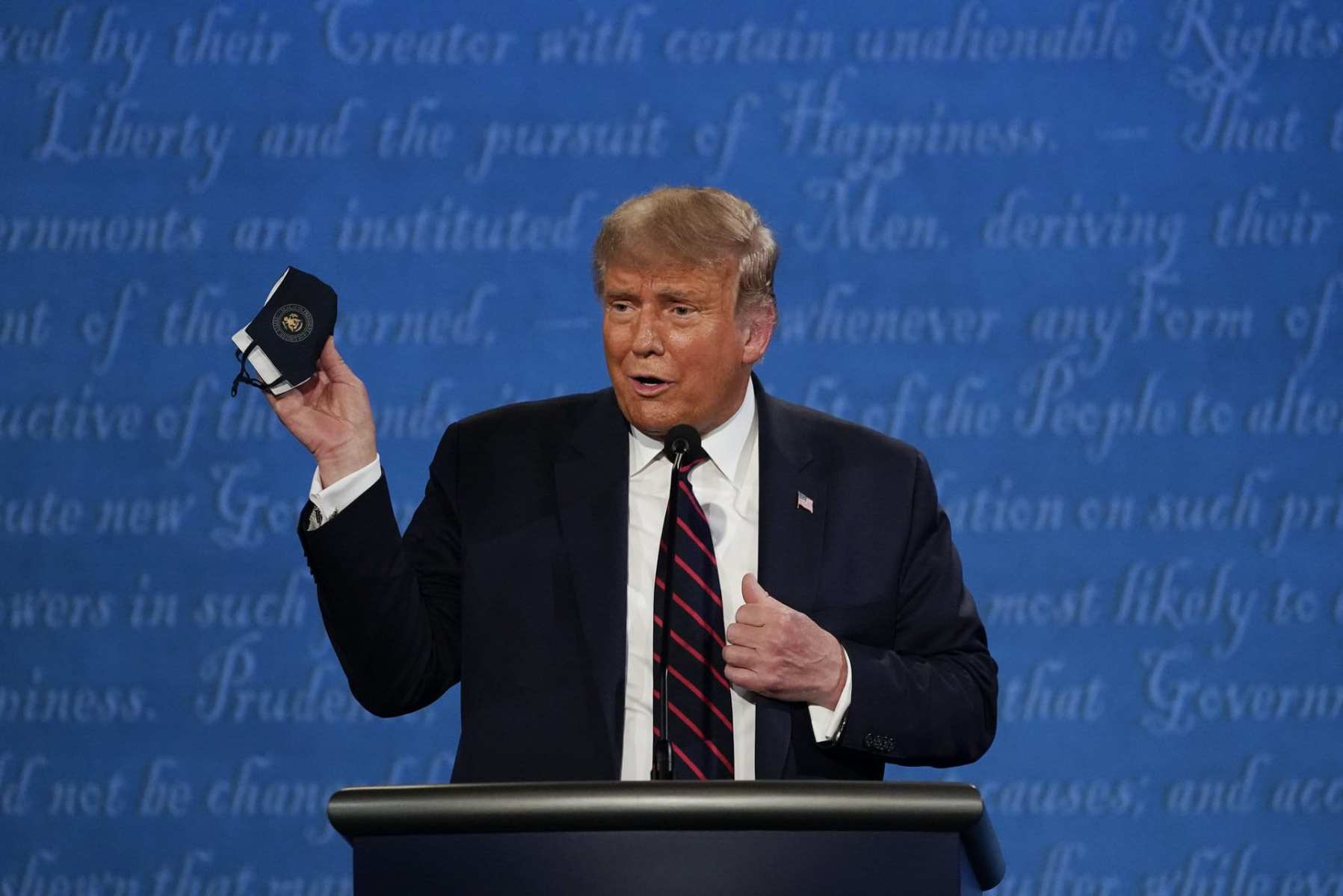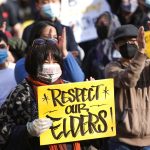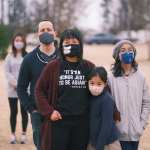Less than 10 minutes into the first presidential debate, Alexandra Mei heard President Donald Trump refer to COVID-19 as the “China plague.” A half-hour later, Mei, 27, was still tuned in as the president sidestepped an opportunity to condemn white supremacy outright, instead telling the Proud Boys — a far-right group linked to violence at protests and often categorized as a hate group — to “stand back and stand by.”
Although much of the post-debate chatter centered on Trump’s Proud Boys comments, Mei found that there was little attention paid to Trump’s xenophobia.
“Deservedly so, the focus is on white supremacists, and his failure to denounce them,” Mei said. “But, I think it is becoming normal to call it the ‘China virus’ — at least to hear it from Trump.”
Friday morning, when she woke up to the news that Trump had contracted the virus, she wasn’t surprised — the president has been unwilling to commit to wearing a mask, and has flouted many Centers for Disease Control and Prevention guidelines.
“What’s really ironic is Trump is blaming China for this virus, but because of him, we’re not doing well at all,” she said.
Early in the pandemic, Trump’s focus on what he called the “China virus” had immediate impacts on the Asian American community. Stop AAPI (Asian American Pacific Islander) Hate, a national coalition, has documented more than 2,500 racial attacks against Asian people since March across 47 states and Washington, D.C. Women reported discrimination nearly two-and-a-half times more than men, from verbal attacks to physical assaults.
The soaring case numbers and the president’s perpetuation of racist attitudes toward Chinese Americans forged a pandemic within a pandemic. Voters most impacted by these intersecting emergencies have been reckoning with how to keep the virus at bay, while also preparing to fight racism and its accompanying harms.
Six months ago, Mei and her friend from graduate school, Diana Tao, launched the Chinese American Voices Instagram page, turning their long text threads about being Chinese American during the pandemic into a place for others dealing with the same feelings to come together.
But still, Mei wonders every day if people will stare her down at the grocery store, or if they’ll turn away from her — or worse. She’s never felt this kind of stress before, a sentiment the Instagram community she co-founded has been wrestling with throughout the pandemic.
“Because of what the president has said, and made super public and made kind of OK to say… that’s now something that Chinese Americans, or basically anyone who looks Asian because people don’t know the difference between Asian races, have to reckon with daily,” Mei said.
Some voters feel Trump has failed to adequately address systemic racism on or off the debate stage. And when Sen. Kamala Harris faces off against Mike Pence at Wednesday’s vice presidential debate, she will be the physical embodiment of the issue voters wish the president would better engage on.
Harris is the first Black and South Asian American woman to be on a major-party presidential ticket. When asked for her reaction to Trump’s comments last week, she told CNN’s Jake Tapper, “The president of the United States … refuses to condemn white supremacists,” adding, “People talk about, ‘Is he dog-whistling?’ Dog-whistling through a bull horn is what he’s doing.”
Her words echo the feelings of voters, who say the president’s racism on display felt like a culmination of his time in office, and are concerned about increased violence in the wake of Trump’s comments.
Sharbari Ahmed, 49, is a Bangladeshi American living in Connecticut. She’s noticed more hostility directed towards her since Trump took office, and even more since the Black Lives Matter movement resurged in the summer.
“I think you are going to see more hate crimes and discrimination directed at all minorities in the run up to the elections,” Ahmed said. “And no matter what, even afterwards, BIPOC need to brace themselves for a whole lot of hate and violence directed our way.”
Some viewers think Trump’s unwillingness to condemn white supremacy will empower violent groups to act, bringing tangible danger to many.
Mike Lee, 18, a nonbinary freshman at the University of South Florida, St. Petersburg, said Trump’s choice of words went beyond an indifference to racial equality, constituting a call to action for racist militias.
“Those are commands,” Lee said. “He knows he leads them. He might not be in cahoots with them, necessarily, but he knows that he has command over them, and he knows they follow his direction.”
Still, others did not take Trump’s comments as an incitement of violence from white supremacist groups. Kimberly McCarin, a 22-year-old law student in Washington, D.C., thought the president sufficiently condemned white supremacy. “He could have said it a bit longer, he did not need to go on a tangent immediately, but other than that, he did say ‘sure,’” McCarin said. “It’s not a full-blown circumvention.”
McCarin intends to vote for the president again this November — four years ago, she cast her first ballot for Trump as an 18-year-old in Florida.
Kimberly Norton also voted for Trump in 2016, but has since regretted that decision. The debate highlighted many of the reasons why, said Norton, 63.
“I didn’t sleep last night — that’s how horrific it was,” Norton said the night after the debate. “There is no question that what occurred last night was bigoted, racist and horrifically embarassing for America.”
Trump’s refusal to condemn white supremacy was particularly startling, said Norton, who called it an “assault on everything that’s decent about democracy.” She plans to vote for Joe Biden in November.
Jessica Ewing, a Black woman and small business owner in Florida, was disappointed in Trump’s refusal to decry white supremacy.
“I was there ready and excited to listen to the answer and then when I didn’t get a clear answer? Him avoiding a clear answer is saying that he supports that,” said Ewing, who owns an event security company in Orlando.
Ewing said she was looking for the president to even just acknowledge the crushing racism that is facing the Black community and condemn bad actors on both sides.
“We have extremists in the Black community, he should acknowledge that he also has extremists that are on his side and denounce that,” she said.
Even if the president had done that during what she called a “cringeworthy” debate, it wouldn’t have changed her decision. Ewing is supporting Biden in November, though she acknowledges that Trump’s presidency was “good financially” for her business.
But there’s another calculus she’s considering.
“Aside from business, you are also just a person,” she said. “Your human rights matter.”
Right before the COVID-19 shutdown, Jenny Wang, 37, was on high alert after her daughter was the victim of a racist gesture at school. When the virus made it stateside, anti-Asian American slurs and xenophobia accompanied it, fueled by the president .
Across America, this translated into violence against Asian Americans — including an April incident in Wang’s home state of Texas in which a man stabbed a family, including two children, at a Sam’s Club.
Wang said these very real threats made many Asian Americans second guess whether to leave the house to go for a run without bringing mace. The first presidential debate of the year flared up these same anxieties for Wang, who said the president’s rhetoric communicates that Asian Americans are not safe.
“When the president uses that kind of rhetoric, it creates a community or a culture of permissiveness. It gives people license to say, ‘well, I can shove that Asian while they’re on their run. I can attack them. I can yell racial slurs, because our president is doing so.’”
In the middle of September, the U.S. House of Representatives passed a resolution condemning and denouncing anti-Asian sentiment, racism, discrimination and religious intolerance related to COVID-19. While it passed, 164 representatives, all from the Republican party, voted against it.
“For a lot of Asian Americans living in these states where these representatives did not vote to protect us, that is heartbreaking,” Wang said. “That felt like a slap in the face.”
That feeling was reinforced after Trump’s comments on Tuesday night.
“It communicates a sense that we are not safe here,” Wang said. “And though it may not be 100 percent true that we’re not safe, it communicates a sense of othering that I think we as Asian Americans have felt for a really long time, but this amplifies that. It is extremely damaging and can also retraumatize a lot of Asian Americans in this current climate.”
Wang is a clinical psychologist who runs the Instagram account “Asians for Mental Health” that includes a directory of Asian, Pacific Islander and Desi therapists. Lately, she’s gotten a lot of messages from people looking for therapists, but she also sees Asian Americans discussing their stories as people share experiences in her Instagram community of 27,000 followers. In addition to fostering community with one another, she encourages Asian Americans to also engage in the racial justice fight.
“Because if we’re not part of this conversation, we will continue to be left out and overlooked,” she said. “We are just as much linked in our liberation with other marginalized and oppressed groups. I think it’s our time to take our place in our conversation, in the actions necessary to move us forward in this entire country.”
Additional reporting by Chabeli Carrazana, Shefali Luthra and Kate Sosin.
Recommended for you
From the Collection






